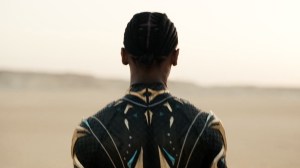In an interview filmed in 1984, Stan Lee pondered the future of Marvel Comics, seeming to have some inkling of the potential for his stories’ future.
Videos by ComicBook.com
Lee created some of the most lasting heroes in comic book history back in the 1960s, including many characters that rule the box office today. Marvel Comics was not always a media juggernaut, however, and it even came close to shutting down on a few occasions. In this resurfaced interview from Entertainment Tonight, Lee’s faith in his creations shines through.
“If you think about it, what are comic books? They’re like motion pictures without the motion, and without the sound,” Lee said. “But they’re stories told visually.”
The interview came from a time before any of Lee’s creations or other Marvel heroes had made it to the big screen, with the exception of a 1944 Captain America serial. It would be many years before a major release came as well, not counting George Lucas’ ill-fated adaptation of Howard the Duck. Lee, however, was always an optimist.
“It’s an incredible thing. The market, the audience, just seems to keep expanding and expanding,” he said at the time. “And a new phenomenon has been the growth of the comic book stores.”
Lee was modest about the possibility for adaptations and expansions, though it was clear that he believed in his work.
“I don’t know about Marvel being an empire, but it is a growing company,” he said fairly. “It’s nice to be working on things that the public seems to enjoy, and to like, and to want more of.“
Lee is known as a titan of the Silver Age of comic books, helping to re-establish Marvel-owned properties such as Captain America and bring in new ones, including Spider-Man, the X-Men and the Fantastic 4.
“I started with marvel comics when I was about 16 and a half,” he recalled. “It was known as Timely Comics in those days. One day my publisher came to me — I was the editor at the time — and he said ‘you know Stan, one of our competitors has a superhero team which is selling very well. Why don’t we do a superhero team?’ So, we came up with the Fantastic 4.”
Lee admitted that the fantastical powers and sci-fi improbabilities of his work were mostly set-dressings for stories that are timeless and universal.
“The whole formula, if there was one, I think was to say: ‘let’s assume that somebody really could walk on walls like Spider-Man, or turn green and become a monster like The Hulk. That’s a given, we’ll accept that. But, accepting that, what would that person be like in the real world if he really existed?’” he explained. “‘Wouldn’t he still have worry about making a living? Or people distrusting him? Or having acne and dandruff? Or his girlfriend jilting him? What are the real problems people would have?’”
“I think that’s what made the books popular, but it took years for the competition to realize that, I’m very happy to say,” he finished with a smile.
Lee passed away on Monday at the age of 95. The iconic creator would go on to appear in dozens of film adaptations of his creations, and see his modest ambitions grow into a multi-billion dollar franchise.








